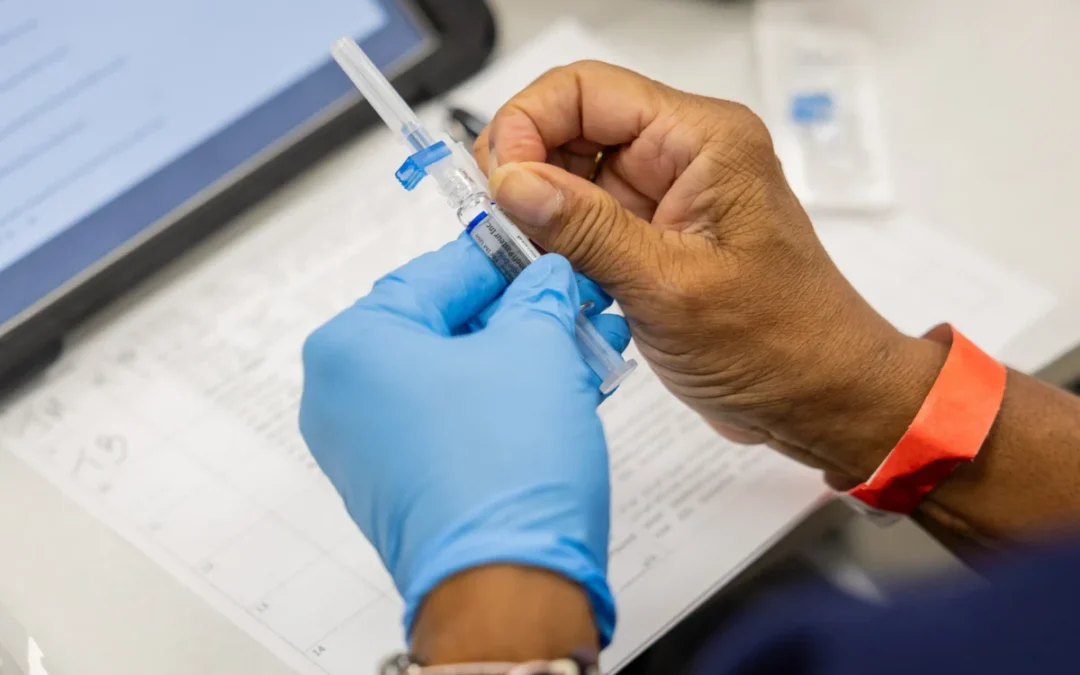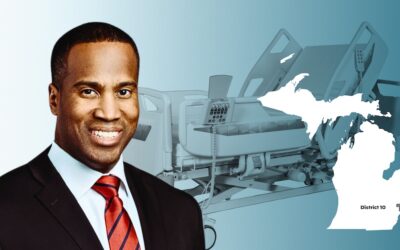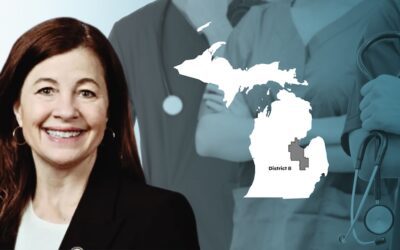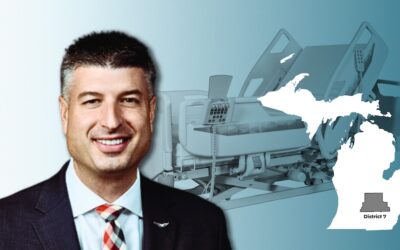
President Joe Biden signed the American Rescue Plan Act in 2021.
Up to 80,000 Oakland County residents are set to have up to $200 million in medical debt wiped clean thanks to funding provided by President Joe Biden’s American Rescue Plan.
MICHIGAN—A new partnership between Oakland County and the nonprofit organization RIP Medical Debt is set to leverage $2 million in funds provided to the county through President Joe Biden’s American Rescue Plan Act to forgive the medical debts of thousands of local residents.
“No matter what a person’s circumstances are, a medical crisis can be devastating for them and their families—physically, financially, and emotionally,” Oakland County Executive Dave Coulter said during a press conference on Thursday. “We should do what we can to help people who find themselves on the brink of bankruptcy due to a health condition or emergency.”
Here’s the deal:
According to county officials, about 114,000 Oakland County residents carry an average of $2,500 in medical debt—which affects about 100 million Americans and is now the leading cause of bankruptcy in the United States, especially within communities of color and rural areas.
Recent estimates from the Kaiser Family Foundation show that the overall medical debt in the United States surpassed $200 billion this year, which is almost the size of Greece’s economy.
RIP Medical Debt is a national nonprofit organization that acquires and abolishes medical debt for people who struggle to pay their bills. The new partnership with Oakland County—which was formally approved by the county Board of Commissioners last week—will enable RIP Medical Debt to use up to $2 million of the county’s federal American Rescue Plan Act funding to essentially buy off the medical debt of up to 80,000 local residents, and then pay it off for pennies on the dollar, effectively erasing it altogether.
“Medical debt hurts working families, ruins credit, and makes life more expensive,” Board Chair Dave Woodward said in a statement. “Wiping out medical debt for families is one more way we’re building an economy that works for everyone, from the bottom up and the middle out.”
What do local residents have to do?
Nothing.
County officials said RIP Medical Debt will work with county employees and local hospital staff over the coming months to identify eligible residents who earn less than four times the federal poverty level or have debt greater or equal to 5% of their annual income. Eligible residents will then be automatically notified via mail that some or all of their medical debt has been canceled.
What are people saying?
Deputy County Executive Madiha Tariq said that medical debt is “detrimental to health” because families often delay medical care when they have debt, which leads to higher rates of diseases. Tariq also said that the debt forgiveness program will pay economic dividends for Oakland County by enabling more residents to get back to work and acquire access to loans.
The debt forgiveness program offered by RIP Medical Debt has already helped some Michiganders—like Kyra Taylor, 34, of Detroit, who spoke at last week’s press conference about the challenges of having diabetes, and how she had about $3,500 in medical debt erased.
“Being free from medical debt is a breath of fresh air,” she said. “No bothering calls or threatening letters. I don’t feel overwhelmed anymore and this all happened at the right time.”
Oakland County Commissioner Charlie Cavell also said he accrued about $6,000 in medical debt in his 20s, which kept him from seeing a doctor, building credit, and acquiring loans.
“Learning that there are tens of thousands of families in Oakland County going through the same thing I went through, and then having a solution for their situation was a humbling and transformational experience for me,” Cavell said in a statement announcing the program.
Where did the funding come from?
As part of the American Rescue Plan Act, which Biden signed in 2021, the federal government provided $6.5 billion in flexible funding to Michigan that was designed to promote an economic recovery from the COVID-19 pandemic. State officials said at least $1.9 billion of those funds have already been spent and another $3.4 billion has been earmarked for various initiatives.
Oakland County received about $244 million from the American Rescue Plan Act, of which $27.5 million was set aside to promote mental health services for adults and students, housing assistance for people facing mortgage foreclosure or eviction, workforce development programs, and to support small business owners who are still recovering from the pandemic.
With roughly one in five Americans in medical debt, the Biden administration also took steps last month to begin the processing of removing medical bills from people’s credit scores—which could improve ratings for millions of people and make it easier for them to obtain an auto loan or a home mortgage.
The proposal—which has yet to be finalized—would also prevent creditors from using medical bills when deciding on loans and stop debt collectors from using credit ratings to pressure people with health care-related debt.
For the latest Michigan news, follow The ‘Gander on Twitter.
Follow Political Correspondent Kyle Kaminski here.
Support Our Cause
Thank you for taking the time to read our work. Before you go, we hope you'll consider supporting our values-driven journalism, which has always strived to make clear what's really at stake for Michiganders and our future.
Since day one, our goal here at The 'Gander has always been to empower people across the state with fact-based news and information. We believe that when people are armed with knowledge about what's happening in their local, state, and federal governments—including who is working on their behalf and who is actively trying to block efforts aimed at improving the daily lives of Michigan families—they will be inspired to become civically engaged.


Fighting a health insurance denial? Here are 7 tips to help
By: Lauren Sausser When Sally Nix found out that her health insurance company wouldn’t pay for an expensive, doctor-recommended treatment to ease...

It’s almost flu season. Should you still get a shot, and will insurance cover it?
Madison Czopek, PolitiFact August 18, 2025 For parents of school-aged children, the fall to-do list can seem ever-growing. Buy school supplies. Fill...

Opinion: Health care is at risk as Grad PLUS loans face the chopping block
The ‘One Big, Beautiful Bill Act’ strips critical funding from medical students and threatens care in rural and underserved communities. We never...

Macomb County households will start losing money this year under Trump’s new spending law. Here’s how much—and who let it happen
Families in Michigan’s 10th Congressional District will shoulder over $500 million in lost funding, while billionaires cash in. In the neighborhoods...

Federal cuts will hit the Flint region hardest. Here’s how much money people there stand to lose—and who tried to stop it
“Everybody will see daily costs go up, like health care, utility bills, and food to help Elon Musk and Jeff Bezos make more money.” Residents in...





